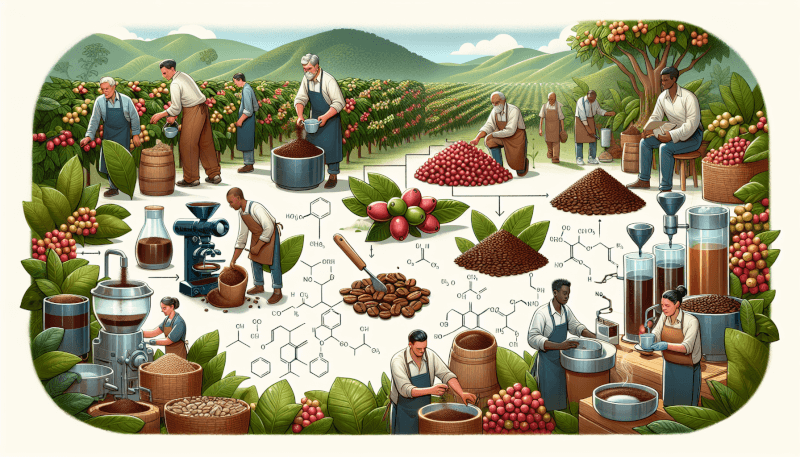Do you ever wonder what goes into your favorite cup of coffee? Well, let’s take a moment to unravel the mystery and explore the fascinating world of coffee beans. From the lush plantations to the coffee roasters, join us on this journey as we uncover the origins and composition of the beloved beverage that starts our day with a warm and inviting embrace. So sit back, grab a mug, and get ready to discover what makes coffee so wonderfully delicious.
What Is Coffee Made Out Of?

Coffee Beans
At its core, coffee is made out of coffee beans. These beans are the seeds of the Coffea plant, which is native to tropical regions around the world. Coffee beans come in various varieties, with the most popular ones being Arabica and Robusta. The beans are harvested, dried, and then roasted to give them their distinct flavors and aromas.
Caffeine
One of the most well-known compounds in coffee is caffeine. It is a natural stimulant that acts on the central nervous system, helping to increase alertness and reduce fatigue. Caffeine is found in varying amounts in different types of coffee beans, with Robusta beans containing almost twice as much caffeine as Arabica beans. The amount of caffeine in your cup of coffee can also depend on the brewing method and the length of time the coffee is brewed.

Polyphenols
Coffee is rich in polyphenols, a type of antioxidant. These compounds help to neutralize harmful free radicals in the body, which can reduce the risk of certain diseases and promote overall health. Polyphenols also have anti-inflammatory properties and may play a role in protecting against chronic conditions like heart disease and certain types of cancer. The specific polyphenols found in coffee include chlorogenic acid, quinic acid, and caffeic acid.
Chlorogenic Acid
Chlorogenic acid is a type of polyphenol that is abundant in coffee. It has been studied for its potential health benefits, including its antioxidant and anti-inflammatory properties. Chlorogenic acid may also help to regulate blood sugar levels and improve insulin sensitivity, making it beneficial for individuals with diabetes or those at risk of developing it. Additionally, chlorogenic acid has been linked to weight loss and is often included in weight loss supplements.

Lipids
Coffee also contains lipids, which are a type of fat. These lipids give coffee its characteristic oily texture and contribute to its flavor profile. While lipids are often associated with negative health effects, their presence in coffee is minimal and unlikely to have a significant impact on your overall lipid intake. In fact, the oils in coffee can have some positive effects on digestion by stimulating the production of gastric acid.
Acids
Coffee naturally contains various acids, which contribute to its taste and acidity levels. Some of the acids found in coffee include citric acid, malic acid, and acetic acid. These acids give coffee its characteristic “brightness” and can vary in intensity depending on the type of coffee and the brewing method. While some people may find highly acidic coffee to be too sharp, others appreciate the complexity and tanginess that these acids provide.

Minerals
Coffee contains a range of essential minerals. Some of the minerals found in coffee include potassium, magnesium, and manganese. These minerals are important for various bodily functions, such as maintaining a healthy metabolism, supporting bone health, and regulating blood pressure. While the mineral content of coffee may not be as high as in certain foods, it can still contribute to your overall mineral intake, especially if you consume multiple cups of coffee throughout the day.
Vitamins
Coffee also contains some vitamins that can provide a boost to your daily nutrient intake. The most notable vitamins found in coffee are niacin (vitamin B3) and riboflavin (vitamin B2). These vitamins play important roles in energy metabolism and can contribute to the overall functioning of your body. However, it’s worth noting that the vitamin content of coffee is minimal compared to other food sources, so relying solely on coffee for your vitamin intake is not recommended.

Sugars
While coffee itself does not contain any sugars, during the roasting process, the natural sugars in the coffee beans undergo a chemical reaction known as the Maillard reaction. This reaction gives coffee its characteristic flavors and aromas. The amount of sugar that remains in the final brewed cup of coffee is minimal, but it can contribute to the overall taste profile of the beverage. If you choose to add sugar to your coffee, be mindful of the additional calories that it adds to your daily intake.
Water
Lastly, coffee is composed of a significant amount of water. The brewing process involves hot water passing through ground coffee beans, which extracts the flavors and compounds present in the beans. The quality of the water used can impact the taste of the coffee, with filtered or purified water generally resulting in a cleaner and more flavorful cup. However, the water used should not be overlooked, as its composition can also affect the extraction of compounds like caffeine and polyphenols.
In conclusion, coffee is made up of a variety of components that contribute to its taste, aroma, and potential health benefits. From the coffee beans themselves to the caffeine, polyphenols, lipids, minerals, vitamins, and even water, each element plays a role in creating the coffee experience we all know and love. So, the next time you sip on your morning cup of coffee, take a moment to appreciate the intricate makeup of your favorite beverage.


